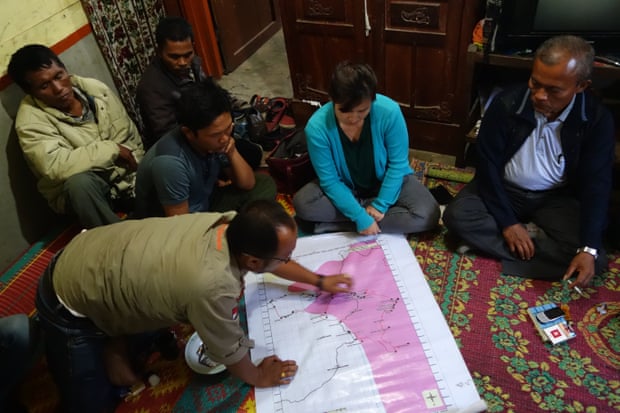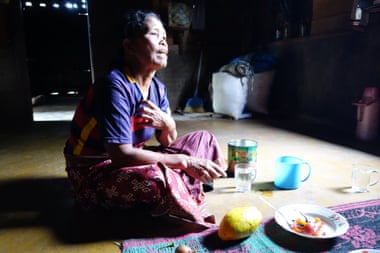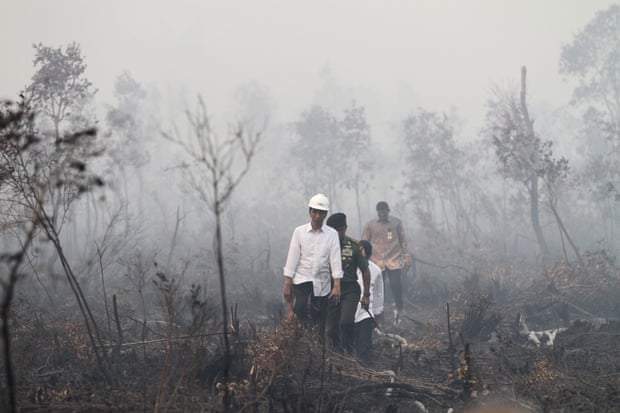'We'd rather die than lose': villagers in Indonesia fight for a land rights revolution


A small community on the island of Sumatra is at the heart of a battle for traditional territories that could finally resolve the muddled and exploitative system of laws governing land ownership in Indonesia
It is cold and late on the Indonesian island of Sumatra. Huddled around a map, a group of elders are planning their battle strategy. In a milestone victory last year, they were promised rights to the land their village has controlled for generations, but today they have had bad news. The local inspector wants to slice off a piece of the forest where they harvest benzoin – a substance like frankincense – and give it to a large pulp company. They see this as a betrayal.
The elders debate in a mix of languages – Batak and bahasa Indonesia – while sipping tea and planning how they will resume the fight the next day. For years now, almost every day has involved this kind of planning.
“We continue the battle. It’s the only option,” says Arnold Lumban Batu, as the group confers with two members of a local community rights organisation. “Honestly, many of us would rather die than lose.”

Members of the small Pandumaan-Sipituhuta indigenous community are at the centre of a historic struggle that just might transform the rules of capitalism in Indonesia, affecting tens of millions of people. Along with a handful of other communities, they have cited indigenous rights provisions in the constitution, and lobbied to secure President Joko Widodo’s support, in the hope that they will be granted legal control over traditional lands.
Other Indonesians in this vast country of rainforests and more than 13,000 islands are watching closely, lest the campaign should provide a model they can emulate. Many land experts, human rights activists and environmentalists believe the approach adopted by the Pandumaan-Sipituhuta community may be Indonesia’s best chance to sort out a muddled and exploitative system of laws that has been in place since a violent, US-backed dictatorship essentially took all the land to distribute to its cronies. But success is far from guaranteed. Political support in Jakarta, the capital, might be fickle, and there are numerous logistical hurdles.

In Pandumaan, villagers proudly remember the night they raided a site where the Toba Pulp Lestari (TPL) company planned to begin cutting down forest, stealing all its equipment. They tell of the trauma when police descended on the community and arrested many of them. Their neighbours in the Aek Lung community planted “guerrilla crops” on traditional land technically controlled by TPL, entering just after the company had harvested its eucalyptus trees. They have received death threats, and accuse the company of burning down their huts, poisoning crops and calling in the military police, who beat them.

“I’m always there, always present and very visible in every protest and direct action that we can take,” says Rusmedia Lumban Gaol, 68, sporting a red sarong and a Barcelona football top as she sits on the floor of her house. “Because with an older women up front, those tough men in the police or hired by Toba are less likely to get out of hand. They’re afraid to hurt me, especially in public. They do have some shame.”
Indonesia’s 260 million people speak more than 300 languages and belong to a wide array of nationalities, all held together by a young democracy within colonial-era borders. President Sukarno, the father of the Indonesian nation, had been attempting some kind of land reform to resolve overlapping European and traditional ownership systems after the Dutch left in 1949.
But his government began to fall apart in 1965, when US-backed generals responded to an alleged coup attempt within the military by taking power and overseeing the systematic execution of up to 1 million civilians for being communist or accused of communist affiliation. The conservative government that formed afterwards, led by General Suharto, ruled the country until 1998. His government’s crimes, including vast corruption, have never been officially condemned, and many perpetrators remain in power.

When Widodo was elected president in 2014 he was seen as a political outsider, similar to Barack Obama, and pledged his support to indigenous rights groups. But, like Obama, he has faced constant attacks from the right, and has buckled on issues dear to his more progressive supporters. To move forward on land transfers, he will need to score some difficult political victories.
“The problem in Indonesia is that you have overlapping claims to the same land, and you have concessions that tend to have been originally granted [under the Suharto dictatorship] to generals and friends of political elites,” says John McCarthy, a professor at Australian National University who studies land rights in Indonesia.
“I would like to think we are on the road to real changes, but the challenges are immense. One important question is, would Indonesia’s investors ever let this happen? It’s like healthcare reform in the United States – no matter how good an idea it may be, you have to look at the coalitions of political support that stand to lose if things change.”
Even if the Widodo government can summon the political power to create a new, effective model for land transfers back to local communities, the detail will be all-important. Experts agree communities should have the option of leasing out their land for commercial purposes for the sake of the country’s economy, which relies on exports of materials coal, palm oil and wood.

“Do I like farming for benzoin? Well, it’s what we do, that’s for sure, and we’re proud of it,” says Sartono Lumban Gaol, as he sits outside the forest one morning with villagers preparing for a few days’ hard work. “But I’m not sure it’s what I’d choose to do if I had lots of other options.”
Not all neighbouring communities have chosen to fight. Many have simply taken a deal. But local organisation KSPPM and others argue that, without knowledge of their full rights, many do so at a huge disadvantage.
TPL denies all accusations that it has broken any laws, saying that if the government chooses to change the legal environment in which it operates, it will be more than happy to adjust its practices.

“We are always working with the government, and we’re sure that any changes that come can result in a win-win-win situation – for the private sector, for the government, and the community,” says Mulia Nauli, a member of the TPL board of directors, in a phone interview from their new plant in northern Sumatra. “We hope to operate in a way that always helps develop the region around us.”
But the issue is much larger than the goodwill of one company. Across Indonesia, nine communities have changed the law governing 13,000 hectares (32,110 acres) of land. Activists want to hold the president to his promise of 600,000 hectares, and then push for a total transformation of 70m hectares.
According to the Indigenous Peoples’ Alliance of the Archipelago (Aman), an indigenous rights group, there are 70 million Indonesians – almost one-third of the population – who could be considered “indigenous” and theoretically in line for new land rights. Others dispute this figure, claiming it is significantly lower.
“Our territory is where our identity mainly comes from,” says Rukka Sombolinggi, secretary general of Aman, speaking in her Jakarta office. “These territories have never been recognised by the state, meaning crimes are committed against us and against the constitution which have been considered ‘legal.’”

Sombolinggi complains that the president has fallen short of the promises he made during his campaign.
Widodo’s office declined to comment on the process but Sandrayati Moniaga, head of Indonesia’s National Human Rights Commission, spoke optimistically.
“The reality is that the constitution recognises the rights of these people, and courts have upheld that right,” Moniaga says. “And Jokowi [Widodo] realised early that this is a problem that needs to be solved.”
Like other experts, however, she points to a number of obstacles to overcome – corruption, a possible pushback in parliament, and hard work on bureaucratic and regulatory challenges – before things will really change.
“What is required is will. Political will here in Jakarta, and will out there on the ground.”
Photograph: Vincent Bevins
Copyright © Source (mentioned above). All rights reserved. The Land Portal distributes materials without the copyright owner’s permission based on the “fair use” doctrine of copyright, meaning that we post news articles for non-commercial, informative purposes. If you are the owner of the article or report and would like it to be removed, please contact us at hello@landportal.info and we will remove the posting immediately.
Various news items related to land governance are posted on the Land Portal every day by the Land Portal users, from various sources, such as news organizations and other institutions and individuals, representing a diversity of positions on every topic. The copyright lies with the source of the article; the Land Portal Foundation does not have the legal right to edit or correct the article, nor does the Foundation endorse its content. To make corrections or ask for permission to republish or other authorized use of this material, please contact the copyright holder.
